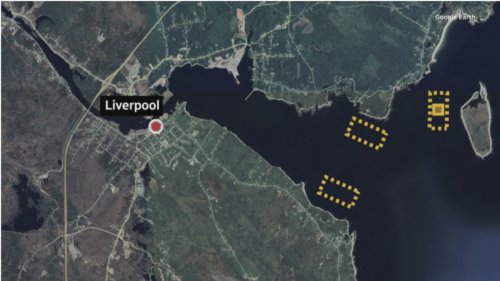Cooke Aquaculture subsidiary Kelly Cove Salmon has cleared another hurdle in its plan to triple Atlantic salmon production in its Liverpool Bay site in the south shore of Nova Scotia.
Kelly Cove proposes to operate two new sites in the bay, where it has been operating since 2011.
The existing farm, which is fallow, typically carries 450,000 fish. The two new sites will have 20 cages each, with each cage measuring 100 meters in diameter. Each site will carry 660,000 fish, boosting the total number of fish that Kelly Cove will be raising in the bay by nearly 300 percent to 1.77 million fish.

DFO’s concerns
On Tuesday, the Department of Fisheries and Oceans (DFO) released a risk-assessment report on the expansion plan.
It noted concerns about the use of chemicals to combat sea lice and the new sites’ potential impacts on lobster and wild salmon in the area.
“We certainly appreciate DFO’s input and expertise and that they’ve looked at it from a scientific perspective. We take everything that they’ve put in the report and we’ll make sure that all that is considered as we move ahead for the Aquaculture Review Board hearing, which the province has not scheduled yet,” Cooke Aquaculture spokesman Joel Richardson told SalmonBusiness on Tuesday.
DFO is not the approving authority
The risk assessment report from the DFO does not mean an approval or disapproval of the expansion plan because DFO is not the aquaculture regulator in Atlantic Canada (it’s the province), unlike in British Columbia.
The report, however, will inform the decision of the final approving authority in the province: the Nova Scotia Aquaculture Review Board. The review board is an independent quasi-judicial body appointed by the provincial government.
New Brunswick-headquartered Cooke Aquaculture has 13 farming sites in Nova Scotia. It’s currently producing around 8,000 metric tons of Atlantic salmon per year, making the province the smallest producer among Cooke Aquaculture’s operations in Atlantic Canada.
“We haven’t grown production Nova Scotia for many years. There’s been almost no growth in Nova Scotia in our farming sites because of the length of time that it’s taken to go through the regulatory process to actually get approved,” said Richardson.
Cooke answers concerns
On DFO’s concern about chemical delousing agents, Richardson said Nova Scotia has the lowest sea lice counts in Atlantic Canada and the company hasn’t found the need to use any delousing chemicals on that site.
Citing Cooke’s extensive work in the region to advance the use of cleaner fish as biological weapon against sea lice, Richardson said Cooke’s operations now use mechanical delousing technology and cleaner fish technology.
As for the concern about lobster and wild salmon, finfish aquaculture and the inshore lobster fishery have co-existed in Nova Scotia and across Atlantic Canada for decades, he said.
“We allow lobster fishers to come into our lease areas to set traps and they have great success in every location where we operate including at our existing Coffin Island farm in Liverpool Bay. Secondly, Cooke Aquaculture is a world leader in wild Atlantic salmon recovery through partnerships with First Nations, government, academia and industry,” Richardson added.
He hopes to see the proposal move forward in the next few months. “This proposal was submitted in 2019, so it’s taken years of scientific and technical review. We are hopeful that the provincial government will advance the Liverpool Bay farming application either towards the end of 2022 or early in 2023.”

